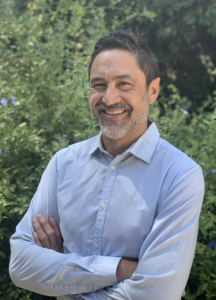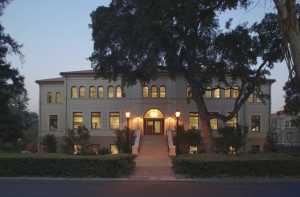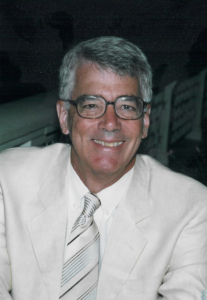22 Interviews



Christopher Chinn Pearsons Hall, home of the Classics department Richard McKirahan
We interviewed Richard McKirahan, professor of Classics at Pomona since 1973. He is the only person in the department with living memory of Harry Carroll.
[Lilly says in the interview that it is Nov. 30, 2020. It was in fact Nov. 30, 2022.]
Edited and cut down for clarity.
When did you meet Harry Carroll and what was he like?
I don’t remember very much about the meeting except it obviously went well, to judge by results. Then I worked with him for ten years. He died in 1983, I think. So I was with him for the best part of ten years as a junior colleague, and he was terrific. He was so supportive and nice and funny. And the students loved him. They worshiped him. I still remember parties at his house. He and his wife Olive, they had no children, so the students were their children. And he took care of everybody, and people remember Harry with great fondness. He wasn’t much of a publisher. He was a great teacher and a very loyal member of Pomona College, and a very influential person on the faculty. In faculty meetings when he stood up, he was a short guy, but when he stood up to his full height and said, “Mr. President, I object,” the president of the college kind of trembled, because Harry did not mince his words. Harry was a very brave person, as is indicated by the fact that in World War II he was in the army. He was a sergeant I think, he wasn’t an officer. And he was one of the first people to go into the Dachau concentration camp. And that was a serious event for him. And after that he realized how cheap life was, so he was a fearless person. Harry loved Greece, and he went there as often as he could, which wasn’t that often. I don’t know how good his modern Greek was at the time, but he organized the connection between Pomona and College Year in Athens, where we’re still sending students. Students would go there, but what Harry did is he wangled this deal so that he would go with them, spend the semester there, teach a course at College Year in Athens, and be a resource. And he would also take them on a field trip before the CYA program began, so that they could go to some places that they wouldn’t go on with CYA.
So Harry was not a trained archaeologist?
No, he was a historian. His PhD was in ancient history. He wasn’t an archaeologist, but the thing is that the American School of Classical Studies sounds very general, and it tries to be, but its basic function is to be the official representative of American archaeology in Greece. So if you want to excavate, you don’t just go with a shovel and start digging it up, you have to get a permit. And they give three excavation permits per year to the United States, and you have to go through the American School. And if they don’t want you to be among the top three, then you don’t get it. So it’s an essential ingredient in how archaeology is done.
Do you know what his attitudes were about archaeology?
Well he knew something about it obviously, because that’s what you learn. That’s what I learned when I went on the American School training program there. So I’m sure he was able to take people around. We never coincided there, so I can’t say anything about that.
I guess we’re getting toward the sherds. I remember one time he went to Morocco with his wife, and I remember some photographs that he had. So he may have picked up some sherds there, some in Greece perhaps, some in Italy. I don’t know where he would’ve done that. He loved going around to archaeological sites, that was very clear. And it helps with teaching, especially in a history course. It’s natural to show people this is the acropolis, this is the agora where the councils met. Socrates was tried on this site. Things like that. And it really brings it to life in ways that if you’re just reading a textbook it doesn’t do. And he was a master of generating interest in that way.
You are a Greek citizen and spend a lot of time in Greece. What has your experience been with Greek archaeology?
Well, I don’t hang out with archaeologists particularly. I had dinner a couple of times with a husband and wife who are both Greek and archaeologists, and they have a house in the same seaside town my wife and I have our house. They showed me a lot of sherds that they’d fund, fragments of pottery and things like that, from tiny little islands off the shore of this town. And they had them in a room there. And hey said, “you can tell from the patterns on this that this is Medieval, or Byzantine period, and this is older.” And some of these things had just been lying around exposed to the elements, and had been there for over 2000 years. They were just sitting there waiting to be picked up by anyone who wants to pick them up. Like these, which I’ve picked up around the place.
Are these from archaeological sites?
No no no, I’m not gonna take anything from an archaeological site. These are from towns just off the coast there by Galaxidi, and they’re coarse ware. That one seems to have some color on the outside. Some kind of coating there. That one is probably the rim of a cup. That has some decoration there, and all these are kind of wavy. I think these are what he was describing as Byzantine. About 1000 CE. These were just lying on the ground. It’s uninhabited islands. There are so many of them. It’s not like they’re endangered species or anything like that, so I didn’t even think to ask. No museum would want these, because if they wanted to they could just get tons of them by going around. So it didn’t occur to me to ask. And here are these two archaeologists who have a bunch of stuff like this in their house and were showing me, and if they’re not worried, why should I be worried? They could lose their licenses or something like that. So I don’t think there’s any issue about this kind of stuff.
So as far as you know, Harry probably just picked these sherds up off the ground?
Yeah, and there’s no telling where they came from either, because as I said, he went to different countries. So maybe if you really knew about ancient pottery you could say, “this one couldn’t possibly come from this country because the clay is wrong,” or something like that. But I don’t know anything about that kind of stuff.
Do you think the purpose of his taking them was for keepsakes? Or do you think there was a teaching or pedagogic purpose?
I didn’t know that there was this collection of sherds until Lilly told me about this recently, so it’s not something that I remember him doing. But he could well have had a drawer someplace with some things that he brought out every year at some point for his ancient history class. I just don’t know.
We also interviewed Christopher Chinn, Professor of Classics at Pomona since 2007.
Edited and cut down for clarity.
When did you find out about the sherds?
When I first got to Pomona in 2007, we were in Crookshank Hall on the third floor. We had a smaller library room that had all kinds of stuff piled up in it. The books that are in Room number two, that was all in there. I didn’t know about the sherds until we moved here [Pearsons Hall] the next year. Everything got moved, and in the storeroom was that file cabinet, and I think Richard said, “Here’s this stuff,” including some photographs in slides, and the sherds. And I didn’t give them a second thought, because I’m not interested in pot sherds at all. Of course I knew about the ethics of that sort of stuff, but I guess it didn’t even occur to me that that was a bad thing to have around, or that Harry had just picked the stuff up… I’m guessing it was probably pretty common if you went over to Greece all the time and you were a scholar and you were around all these sites you would probably just pick stuff up and stick it in your pocket. Just the imperialist, privileged way, I suppose. But that’s how I saw them at first. And then we put them in the drawer. We brought them out one other time when we had brought a visiting archaeologist at Scripps, a scientific archaeologist, and she just wanted to have a look. And she didn’t mention anything about the ethics, I think she may have just taken them to a class and put them back.
What do you think Harry Carroll’s impact has been on the Classics department at Pomona?
Harry died when I was ten years old, so I did not know him. He became the sole classicist after a series of only a few. He was the only guy in the department, and he was the guy who evidently brought it back, is what his eulogy says, written by some other faculty member. But he was the only classicist for a long time, and then he hired Richard McKirahan. So they held the fort for a really long time, until enrollment expanded and they got some visiting professors. And there were a bunch of visitors until my position was finally approved. After Harry died, several people held that historian position, but none stuck until [Professor Ben] Keim.
So Harry’s impact has been on the shape of the department, through hiring. Through Richard and then it’s almost like a coaching tree, through the people that Richard hired, including me, Keim, and so on. But also more prominently in the funding. As liberal arts departments go, we’re pretty wealthy, a lot of money for a lot of things. And you’ve probably noticed that if you need something we can usually pull it off. There are certain restrictions on this, but there are two main funds, both are named in his honor. One was funded by his students, the alumni who made this large gift, and that largely funds the speakers and things associated with speakers (their travel, accommodations, and so on). The other is his own estate that his wife, who survived him by a little bit, established: the Harry and Olive fund. That’s everywhere. So you find, physically, his name in all the books that are bought through those funds. And when speakers come that little spiel we give [before speakers’ presentations] that’s effectively required for that sort of thing. And more generally, all the stuff that we’re able to do, like going to Getty night, that’s funded by them, all that sort of stuff.
In your ideal world, what would happen to the sherds?
I guess they should probably go back, or at least be registered in whatever way. I’m not even sure they want them back, but that’s what should happen. I’ve never used them as a teaching tool, so I don’t think I would miss them, again because that’s not my area of expertise.

